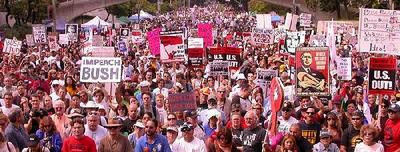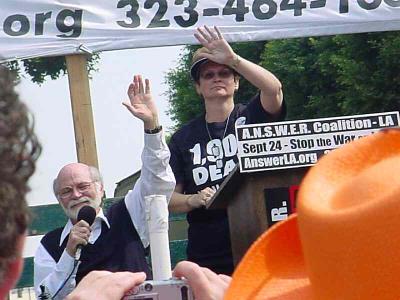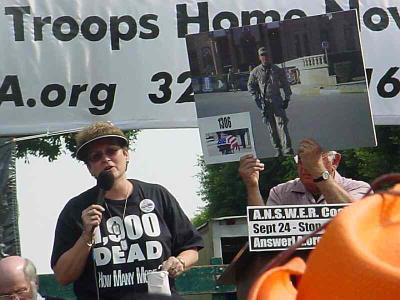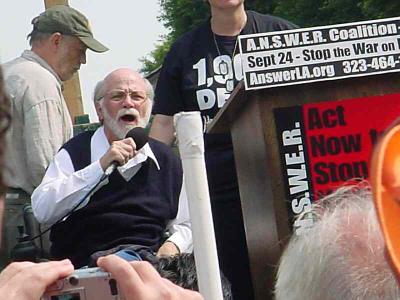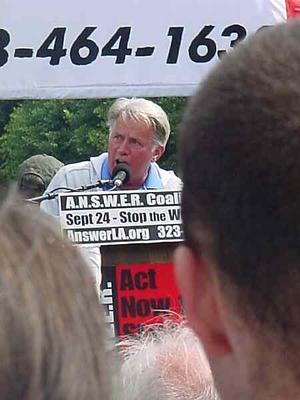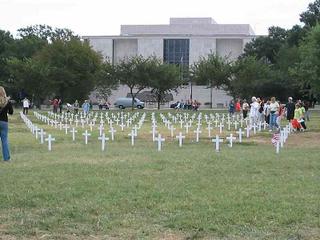

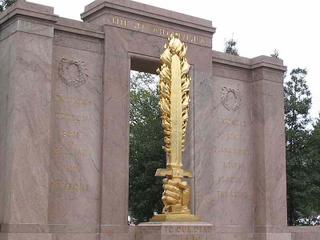

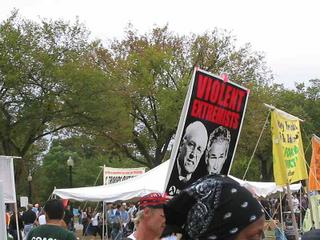
PV Vivekanand
"Opposition to Crawford protest grows as camp expands" — this was the headline given to a report from outside US President Geroge Bush's ranch in Crawford, Texas, where war protesters were gathering to support an American women, Cindy Sheehan, who lost her son in the Iraq war and who is demanding that the US brings its troops home from Iraq.
Parallel to that are hundreds of Internet postings expressing solidarity with "Cindy" and a handful of other messages opposing her, accusing her of having a political agenda and contending that she is staging the protest against the wishes of her husband's parents — grandparents of her son Casey Shehan, who died in Iraq on April 4, 2004.
But despite the low media coverage of Cindy's campaign, which includes a demand for a personal meeting with Bush, it could mushroom and create intense pressure on the administration in a fashion unprecedented in American history, save some aspects of the anti-war camp that existed during the years of the Vietnam War.
Indeed, it is an all-American affair, pitting those who lost their loved ones in the war in Iraq and who have seen through the deception of the military action against a combination of others, who include families who believe that the US military is waging a justified war, those who simply support the code of military conduct (obey first and ask questions later), those who are politically aligned with the Republicans, those who rally behind whatever the government is doing (for them, the administration could never go wrong) and, finally, those aligned with the neoconservatives whose agenda is to kill any voice that is raised against the Iraq war they had planned and executed with ulterior motives that have little to do with the interests of the American people.
However, those who oppose Cindy's campaign have only slippery excuses to make. They don't want to go into the substance of her demand. She is accused of having a political agenda that is dictated by the Democrats. That might indeed be true, but then the easy and typical answer to that contention, as one could see from the web postings, is: "Of course she has an agenda. She wants to stop a war that was started with lies. Why would anyone have a problem with this?"
Some people seem to have gone a step further to discredit Cindy.
An e-mail message purportedly sent by the Shehan family is seen to have originated with the neoconvervatives and their cronies.
It says: "The Sheehan Family lost our beloved Casey in the Iraq War and we have been silently, respectfully grieving. We do not agree with the political motivations and publicity tactics of Cindy Sheehan. She now appears to be promoting her own personal agenda and notoriety at the the expense of her son's good name and reputation. The rest of the Sheehan Family supports the troops, our country, and our President, silently, with prayer and respect."
It is signed: "Casey Sheehan's grandparents, aunts, uncles and numerous cousins."
Indeed, it has all marks of authenticity. But the clinch came when anti-war campaigners failed to locate the family. They located a woman called Cherie Quartarolo, who, according to the email, is an aunt of the late soldier and lives in California.
While they could not prove she was not related to Casey Shehan, all others named in the message, including the "grandparents" of the killed soldiers, could not be traced at all.
"The powerful search engine we used to confirm her identity also tracks possible relatives, and Casey's parents, Cindy and Pat Sheehan, didn't come up, nor did any other known relatives of Casey Sheehan," says those who tried to establish the authenticity of the message.
"Also, to this date, despite all the extensive press coverage of Casey Sheehan's death and Cindy Sheehan's activism, there is nothing that mentions Quartarolo...," they said.
Well, the affair reflects the extent to which the war-mongers in the US would to quell dissent.
In Cindy's case, they have all the more to fear because she appears to be a honest-to-God American mother with a genuine grievance, which is easily shared by at least 1,720 other American families (if we take the official Pentagon figures of American deaths in Iraq since March 2003).
What does Bush say about Cindy?
Bush, in a news conference on Thursday, said he had tried to comfort many slain soldiers´ relatives and that he grieves for each loss, but did not say whether he will meet with Sheehan.
"Listen: I sympathise with Mrs. Sheehan. She feels strongly about her position. And she has every right in the world to say what she believes. This is America. She has a right to her position," Bush said. "And I thought long and hard about her position. I´ve heard her position from others, which is: Get out of Iraq now. And it would be a mistake for the security of this country and the ability to lay the foundations for peace in the long run if we were to do so."
Casey Sheehan was killed in Sadr City, Baghdad, five days after he arrived to take up duty in Iraq "because of the ruinous policies of our government," says his mother.
On Friday, Bush passed by the site where Cindy and some 100 fellow supporters, including three other mothers who lost sons in Iraq, are camped. He was on his way to a fund-raising dinner at a nearby ranch. Quite aptly, Cindy held up a banner saying: "Why do you make time for donors and not for me?"
Activists believe that Bush is refusing to meet the protester because she has said in public remarks that although she had met the president in June — as part of a military family meeting — she would like to have time with him again because it has now been clearly established that intelligence was manipulated to pave the way for the invasion and occupation of Iraq. Obviously, Bush would not want to be put in a position where he would be forced to answer some blunt questions that he has been evading since July when official minutes of a July 23 meeting at the office of the British prime minister showed that the Bush administration had decided to attack Iraq and was doctoring intelligence reports to justify the action.
In any event, judging from reports coming out of Crawford indicate that Cindy's initiative could make many American families realise that they were deceived into a disastrous war by their own government. In the meantime, it subject to speculation how the war-mongers would seek to pre-empt it.
In the meantime, the campaign to support Cindy is growing.
A posting on whatreallyhappened.com refers to Bush's rejection of the demand to withdraw troops from Iraq. "Pulling the troops out would send a terrible signal to the enemy," he said on Thursday.
The posting says: "What enemy? We were told we were invading Iraq to end the threat of weapons of mass destruction. Well, there WEREN'T any weapons of mass destruction in Iraq. The reason we were given for this war DOES NOT EXIST. The enemy was declared to be weapons of mass destruction, so the enemy does not exist.
"Bush started a war with lies, and he is desperate to keep those lies and the war going, and it will come down to who wants it more," it says.
It tells the American people:
"Right now Bush and his neocon warhawks profiteers are urging their shills to head for Crawford to try to shout down Cindy's message. YOU need to get down there and stand with Cindy, to protect her message, to remind the nation and the world that Bush and the Neocons LIED to start this way and he will go on lying to protect it and grow it, until the entire world is aflame.
"We are out of time. If you do not choose to fight against the war-mongers now, you will soon have no choice but to fight for them from now on. There is no neutral ground. You are either part of the solution or part of the problem.
"Get in your car NOW."
With input from news agencies and websites

